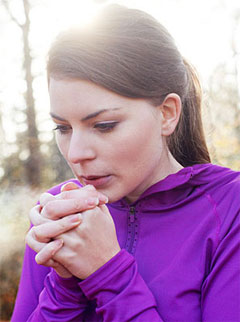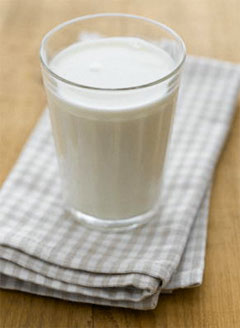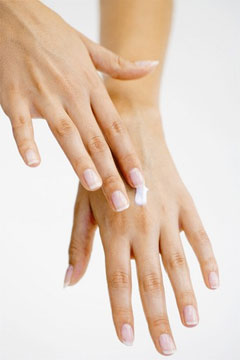|
|
Dry, Chapped Hands: a winter itch
 Chapped hands are a result of very
dry skin,
occurring as a result of reduced moisture, or water, content of the
skin. The
surface of the skin holds a certain amount of
water.
When the water content decreases, the skin becomes dry, itchy, and
uncomfortable. Chapped hands are a result of very
dry skin,
occurring as a result of reduced moisture, or water, content of the
skin. The
surface of the skin holds a certain amount of
water.
When the water content decreases, the skin becomes dry, itchy, and
uncomfortable.
Most of us have our pet peeves about our hands. Some have dry coarse hands;
others have cold clammy hands. Some have soft thin delicate hands where the skin
tears easily. A little knowledge would help you to exposed to minor cuts, burns
and bruises in the kitchen or while doing chores.
Symptoms of Dry, Chapped Hands:
Hands that are chapped usually have the following characteristics:
-
Roughness
-
Dryness
-
Redness
-
Peeling
-
Cracking
-
Sensitivity
-
Tenderness
Causes and risks Factors:
-
Some individuals have a genetic predisposition to dry skin. Their skin
tends to become drier, with
age.
-
Dry air, resulting from winter's low humidity and the use of indoor
heat, can cause skin to dry out.
-
Long, hot baths and showers can also make skin dry.
Factors
that increase a person's risk of chapped hands include the following:
-
 Frequent hand washing, which may be associated with the person's job Frequent hand washing, which may be associated with the person's job
-
Prolonged exposure to
cold, dry weather
-
-
Allergic reactions to skin care products
-
History of a skin disorder, such as eczema
If chapped hands
are left untreated, the person may have -difficulty doing things
without wearing protective gloves,
recurrent skin conditions such as
outbreaks of eczema or skin inflammation,
infections, which may
occur when bacteria enter cracks in the skin
|
Here are some household tips to rectify the problem.
-
Sugar and oil:
Take 3 tablespoons of sugar, one tablespoons of oil (any oil,
vegetable oils, olive oil or almond oil will do). Mix the sugar and oil,
beat to a blended consistency. Rub into the hands. Keep rubbing for 5 -7
minutes, then rinse well with warm water. The dead coarse skin is removed
and the hands appear soft and clean.
-
Sugar and Lime: Take one tablespoon lemon juice, one tablespoon sugar, one
tablespoon water. Lightly mix all these ingredients and rub all over the
hands. Keep rubbing it in till it starts to dry. Rinse with water. Softens
coarse hands.
-
Honey Lemon Juice and Oil: Take one-teaspoon oil (any oil,
vegetable oils, olive oil or almond oil will do), one teaspoon lemon juice,
one tablespoon rose water. Mix well together. Rub over crusty elbows,
knuckles and other hardened areas. Keep rubbing it in, then after 5 - 7
minutes rinse off. This not only nourishes the skin, but also keeps it soft.
-
Lemon Juice and Barely Powder: Take one tablespoon barley powder,
one tablespoon lime juice. In case barley powder is not available, boil
barley for 10 minutes. Extract the juice and mix it with lime juice. Apply
on the finger joints to get rid of dark circles. Rub well into the skin.
Leave it to dry and then apply and rub again. After it has dried, then rinse
off. Softens and whitens the knuckles.
-
Potato
Juice:
Take two potatoes, peel and grate them. Extract juice of these
potatoes. Apply all over the hands, especially over the knuckles and finger
joints. The potato juice can also be applied over scars left by wounds, cuts
or burns. If used regularly, it helps to eliminate these scars and lightens
dark areas around the knuckles and finger joints.
-
Onion
Juice:
You can relieve minor kitchen burns on the hand just by rubbing
a raw onion on the burn. Take an onion, cut it into half and rub on the
burned area. It immediately reduces inflammation and relieves pain.
-
 Cold
Milk: Did you know that blisters on the hands while cooking, can be
cured with a cold milk compress if applied immediately? Put some cold milk
on the blister; dab it two or three times on the blisters. It soothes
immediately and actually aids healing. Cold
Milk: Did you know that blisters on the hands while cooking, can be
cured with a cold milk compress if applied immediately? Put some cold milk
on the blister; dab it two or three times on the blisters. It soothes
immediately and actually aids healing.
-
Turmeric
Powder:
So often hands get minor cuts while chopping vegetables or
while performing other household chores. In cutting your fingers or hands,
immediately apply turmeric powder onto the wound. It stops bleeding and aids
healing.
-
Gelatin:
For those people who have split nails and cracked hands, a good 'soak' in
gelatin will certainly help. Take a packet of gelatin or lemon jelly, pour
it into a cup of hot water. Make a packet of gelatin or lemon jelly, pour it
into a cup of hot water. Make a paste and put it to set. When it has set,
soak the hands in this jelly, keep rubbing the nails and cuticles as well as
the hands. Keep them soaked for at least 15 minutes. A regular use of this
treatment prevents cracks on the skin of the fingers and the cracking and
splitting of fingernails. Eating jelly also helps promote a healthy growth
of nails.
-
Buttermilk and Almond Oil: Take one tablespoon almond oil and one cup buttermilk.
Mix well, apply on the hands. Massage well, let it dry, then apply again.
Repeat this till all the solution is used up. Use this at night, before
bedtime. Wear cotton gloves and sleep. Next morning, rinse well. This
treatment ensures that the hands remain soft and maintain a good skin
texture.
What can be done to prevent the symptom?
Women subject to dry skin should soak thoroughly while bathing or showering.
However, they should limit the amount of soap they use and the length of time
they're exposed to the water. Some, may be able to use mild, moisturizing soap
all over the body. A few need to limit soap use to the underarms and genitalia.
For mildly dry
hands, almost any lubricant will provide sufficient relief. For
greater dryness, moisturizers with humectants such as glycerin (10
per cent) sorbitol, urea, alpha-hydroxy acids (four to eight per
cent) are best. For very dry hands, products rich in petroleum jelly
will likely provide the most relief.
|
After
patting the hands dry with a towel, apply a moisturizer. Moisturizers coat the
skin with oil, block evaporation of the skin's natural moisture and trap water
in its surface. While they can't cure dry skin, moisturizes provide protection,
relieve the dry, itchy feeling and reduce the tendency to crack. Although most
of the water in the cream or moisturizer evaporates, the oil stays on as a
lubricant, enabling the skin to retain moisture.
There are two types of moisturizers are available over-the-counter:
-
 Cosmetic
moisturizers, which provide immediate relief of dry skin but last only while
they are applied to the skin. For people with a mild case of dry skin, a
cosmetic moisturizer is enough to keep the skin from feeling dry. Cosmetic
moisturizers, which provide immediate relief of dry skin but last only while
they are applied to the skin. For people with a mild case of dry skin, a
cosmetic moisturizer is enough to keep the skin from feeling dry.
-
Therapeutic moisturizers, which have demonstrated the ability to act as
a barrier that keeps water from evaporating from the skin. Many therapeutic
moisturizers contain mineral oil or petroleum.
The best way to avoid chapped hands is to keep them well dried, protected
from the cold and wind, to wear cotton-lined vinyl gloves for wet work (rubber
can cause allergies) and frequently apply hand creams to moist skin. If the
problem persists, consult a dermatologist, who may prescribe creams containing
alpha hydroxy acids or urea to get rid of dead skin and minimize itching.
Dated 04 November 2013
Related Links
|
|
|
|
|









